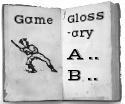Corkball: Difference between revisions
No edit summary |
No edit summary |
||
| Line 2: | Line 2: | ||
|Term=Corkball | |Term=Corkball | ||
|Game Family=Fungo | |Game Family=Fungo | ||
|Game Eras=Derivative | |Game Regions=US | ||
|Game Eras=Derivative, Post-1900, Contemporary | |||
|Invented Game=No | |Invented Game=No | ||
|Description=<p>Primarily a St. Louis pastime, derived from baseball, involving down-sized bats and balls. The ball is pitched overhand from a distance of 55 feet. There is no running, but imaginary runners advance as in other scrub games. Hit balls are defined as singles, and sometimes as longer hits, depending on where they land. The game is said to have originated in around 1900 among brewery workers using broomsticks and the bungs [corks] used to seal beer barrels. Team sizes vary from | |Description=<p>Primarily a St. Louis pastime, derived from baseball, involving down-sized bats and balls. The ball is pitched overhand from a distance of 55 feet. There is no running, but imaginary runners advance as in other scrub games. Hit balls are defined as singles, and sometimes as longer hits, depending on where they land. The game is said to have originated in around 1900 among brewery workers using broomsticks and the bungs [corks] used to seal beer barrels. Team sizes vary from two to five players. Annual tournaments have been held at least through 2012. Dedicated corkball fields are reportedly found in St. Louis</p> | ||
|Sources=<p><span>Special thanks to Jeff Kittel, emails of 10/11/09 and 9/22/13, for material on this game.</span><span> A website on corkball is found at <a href="http://www.playcorkball.com,">http://www.playcorkball.com,</a> as accessed 9/25/13. It includes a 2012 paper on the history and context of the game. </span><span>See also </span><a href="http://www.angelfire.com/sports/corkball/STLhistory.html">http:///www.angelfire.com/sports/corkball/STLhistory.html</a><span>. Accessed 10/8/09.</span></p> | |Sources=<p><span>Special thanks to Jeff Kittel, emails of 10/11/09 and 9/22/13, for material on this game.</span><span> A website on corkball is found at <a href="http://www.playcorkball.com,">http://www.playcorkball.com,</a> as accessed 9/25/13. It includes a 2012 paper on the history and context of the game. </span><span>See also </span><a href="http://www.angelfire.com/sports/corkball/STLhistory.html">http:///www.angelfire.com/sports/corkball/STLhistory.html</a><span>. Accessed 10/8/09, but not found 9/25/13.</span></p> | ||
|Has Supplemental Text=No | |Has Supplemental Text=No | ||
}} | }} | ||
Revision as of 08:23, 25 September 2013
| Game | Corkball |
|---|---|
| Game Family | Fungo |
| Location | |
| Regions | US |
| Eras | Derivative, Post-1900, Contemporary |
| Invented | No |
| Tags | |
| Description | Primarily a St. Louis pastime, derived from baseball, involving down-sized bats and balls. The ball is pitched overhand from a distance of 55 feet. There is no running, but imaginary runners advance as in other scrub games. Hit balls are defined as singles, and sometimes as longer hits, depending on where they land. The game is said to have originated in around 1900 among brewery workers using broomsticks and the bungs [corks] used to seal beer barrels. Team sizes vary from two to five players. Annual tournaments have been held at least through 2012. Dedicated corkball fields are reportedly found in St. Louis |
| Sources | Special thanks to Jeff Kittel, emails of 10/11/09 and 9/22/13, for material on this game. A website on corkball is found at http://www.playcorkball.com, as accessed 9/25/13. It includes a 2012 paper on the history and context of the game. See also http:///www.angelfire.com/sports/corkball/STLhistory.html. Accessed 10/8/09, but not found 9/25/13. |
| Source Image | [[Image:|left|thumb]] |
| Comment | Edit with form to add a comment |
| Query | Edit with form to add a query |
| Has Supplemental Text |
Comments
<comments voting="Plus" />
